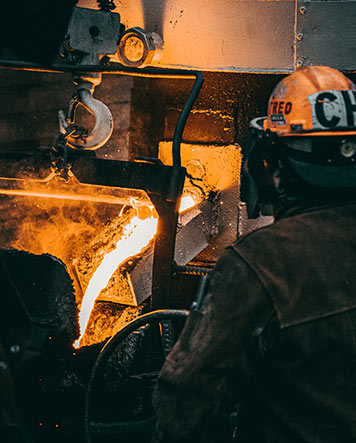PLCs and DCSs in Iron & Steel and Non-Ferrous Metals Production: Automation for Demanding Environments
Introduction
The iron & steel and non-ferrous metals (e.g., aluminum, copper, zinc) industries are characterized by large-scale, continuous processes, extreme temperatures, hazardous environments, and the need for precise control to achieve high-quality products and efficient operations. Programmable Logic Controllers (PLCs) and Distributed Control Systems (DCSs) are indispensable automation technologies that play critical roles throughout the entire production chain, from raw material handling to finished product processing. This article explores the diverse applications of PLCs and DCSs within these demanding industries.
PLC Applications in Iron & Steel and Non-Ferrous Metals Production
PLCs are used for discrete control, managing individual machines, and handling specific process steps:
- Raw Material Handling: PLCs control conveyor systems, stackers, reclaimers, and other equipment used to handle raw materials such as iron ore, coal, limestone, and scrap metal.
- Coke Oven Control: PLCs manage the complex process of converting coal into coke, including charging, heating, pushing, and quenching operations.
- Blast Furnace Control (Stove Control): PLCs control the operation of hot blast stoves, which preheat the air blown into the blast furnace.
- Basic Oxygen Furnace (BOF) Control (Lance Control): PLCs control the oxygen lance, which injects oxygen into the BOF to refine molten iron into steel.
- Electric Arc Furnace (EAF) Control (Electrode Positioning): PLCs control the positioning of electrodes in EAFs, which use electric arcs to melt scrap metal.
- Casting Machine Control: PLCs control the operation of continuous casting machines, which solidify molten metal into slabs, billets, or blooms.
- Rolling Mill Control (Stand Control): PLCs control individual stands in rolling mills, which reduce the thickness and shape of metal products.
- Finishing Line Control: PLCs control various processes in finishing lines, such as pickling, annealing, galvanizing, and coating.
- Material Tracking: PLCs track the movement of materials throughout the plant, providing real-time information on inventory and production status.
- Safety Systems: PLCs are used in safety instrumented systems (SIS) to monitor critical parameters and initiate emergency shutdowns if necessary. This is extremely important in these hazardous environments.
DCS Applications in Iron & Steel and Non-Ferrous Metals Production
DCSs are employed for continuous process control, plant-wide integration, and overall system management:
- Blast Furnace Control (Overall): The DCS oversees the entire blast furnace operation, coordinating the charging of raw materials, hot blast control, tapping of molten iron and slag, and gas cleaning.
- Basic Oxygen Furnace (BOF) Control (Overall): The DCS manages the entire BOF process, including oxygen blowing, flux addition, temperature control, and endpoint prediction.
- Electric Arc Furnace (EAF) Control (Overall): The DCS controls the overall EAF process, including power input, scrap charging, melting, refining, and tapping.
- Continuous Casting Control (Overall): The DCS manages the entire continuous casting process, including mold level control, cooling water control, and withdrawal speed control.
- Rolling Mill Control (Overall): The DCS coordinates the operation of multiple stands in rolling mills, controlling speed, tension, gauge, and shape.
- Sinter Plant Control: DCSs manage the sinter plant, which agglomerates fine iron ore particles into a larger, more porous material suitable for the blast furnace.
- Pellet Plant Control: DCSs control the pellet plant, which produces iron ore pellets, another form of blast furnace feed.
- Energy Management: DCSs optimize energy consumption throughout the plant, including steam, electricity, and fuel usage.
- Environmental Monitoring and Control: DCSs monitor emissions and control pollution control equipment to ensure compliance with environmental regulations.
- Advanced Process Control (APC): DCSs often incorporate APC techniques, such as model predictive control (MPC), to optimize process performance and improve product quality.
- Alarm Management: DCSs provide sophisticated alarm management capabilities to alert operators to abnormal conditions and prevent incidents.
Hybrid Systems and Integration (PLCs and DCSs)
The iron & steel and non-ferrous metals industries commonly use hybrid systems, combining the strengths of PLCs and DCSs:
- PLC for Local Control: PLCs handle the fast, discrete control of individual machines and specific process steps.
- DCS for Overall Coordination: The DCS oversees the entire production process, manages plant-wide utilities, and provides a unified platform for monitoring and control.
- Data Exchange and Communication: PLCs and DCSs communicate with each other, exchanging data and coordinating operations. This is critical for seamless operation and optimization.
- MES/ERP Integration: Both PLCs and DCSs can be integrated with Manufacturing Execution Systems (MES) and Enterprise Resource Planning (ERP) systems. This provides real-time data for production planning, scheduling, inventory management, quality control, and cost accounting.
Benefits of PLCs and DCSs in Iron & Steel and Non-Ferrous Metals Production
- Improved Product Quality and Consistency: Precise control ensures consistent product quality and reduces variations in chemical composition, mechanical properties, and dimensions.
- Increased Production Efficiency: Automation reduces cycle times, increases throughput, and minimizes downtime.
- Enhanced Safety: Automation reduces the risk of human error and improves workplace safety in hazardous environments.
- Optimized Resource Utilization: DCSs help to minimize energy consumption, raw material waste, and operating costs.
- Reduced Environmental Impact: DCSs help to minimize emissions and ensure compliance with environmental regulations.
- Data-Driven Decision Making: Real-time data from PLCs and DCSs provides valuable insights for process optimization, predictive maintenance, and continuous improvement.
- Scalability and Flexibility: PLC and DCS systems can be easily scaled and adapted to accommodate changes in production requirements or new product development.
Conclusion
PLCs and DCSs are essential technologies for the modern iron & steel and non-ferrous metals industries. They provide the automation, control, and integration capabilities needed to manage complex, continuous processes, ensure safety, improve efficiency, and meet stringent quality and environmental requirements. The trend towards hybrid systems, advanced process control, and greater integration with MES/ERP will continue to drive innovation and optimization in these industries, ensuring the production of high-quality metals for a wide range of applications. The harsh environment and safety-critical nature of these processes make the reliability and robustness of PLC and DCS systems paramount.
 中文版
中文版






